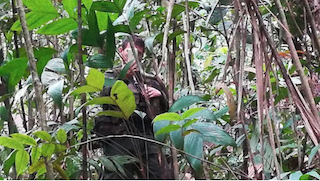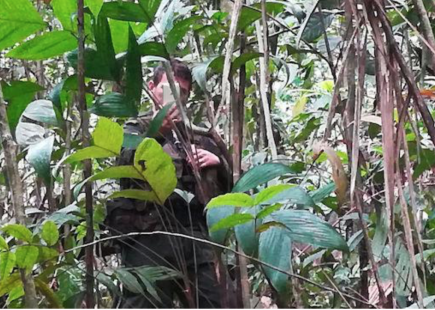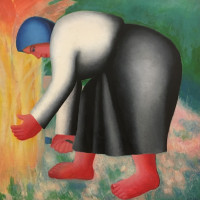With Alvaro Uribe Velez’s right-wing party winning the March 11, 2018 elections, the authoritarianism that rules Colombia in favour of transnational corporations and national elites has been reaffirmed.
Peace building has become a pivotal project in Colombia in recent years, with agrarian issues central. Given years of war, the 2016 ceasefire with FARC (the Colombian Armed Revolutionary Forces) and the partial truce from October 2017 to January 2018 with ELN (National Liberation Army), together with the first steps of implementing the peace agreement, have been crucial moments.
But what is peace? And how is it linked to emancipatory projects, particularly in rural areas, where the civil war raged for so long?
What is peace?
In Colombia, there are highly opposed understandings of peace. On one side, the Juan Manuel Santos’ right wing government approach has been characterised as a “pax neoliberal”, aiming to enforce authoritarian, corporate, market-led policies under the guise of peace negotiations. On the other side, the view of social movements is grounded in recognition of and demands for social, environmental, economic and gender justice as the only possible basis for a dignified life.
The view of social movements is grounded in recognition of and demands for social, environmental, economic and gender justice as the only possible basis for a dignified life.
Yet violence continues through the ongoing criminalisation and assassination of territorial defenders; 282 of whom have been murdered in the last year, even after the ceasefire. As the election outcomes showed, debate has been pushed towards favouring the transnationalisation of the economy at the expense of life itself.
Underlying agrarian struggles
The agrarian question is central. This has been the structural cause of continuous armed uprisings by peasant and indigenous groups in Colombia over the last 60 years. But, while the possibility of agrarian reform was a trigger for armed action, it was even more critical as a motivator for countless participatory initiatives and popular processes initiated by social organisations and movements.
Since the 1970s these processes were developed in dialogue with the state, reflected in a myriad of law and policy proposals. However, especially since the 1990s, these efforts have been systematically rejected and attacked both by right-wing governments and paramilitary groups, consistently undermining emancipatory alternatives.
Understandings of ‘peace’ have influenced responses to the agrarian question through the use of a rural development concept by successive governments. Former president, now senator, Alvaro Uribe Velez, promoted what he called ‘democratic security,’ while Santos has focused on his ‘national unity’ initiative. Despite Uribe Velez being under investigation for possible links with paramilitary groups and witness fraud, his party nonetheless triumphed in the recent elections, revealing once again the manipulation of popular support for an authoritarian project.
Debate has been pushed towards favouring the transnationalisation of the economy at the expense of life itself.
During the implementation of the ‘democratic security’ policy, takeovers of land by paramilitary groups and consequent displacement of local people was consolidated into a new land possession regime, based on transnational occupation of land and territory. In this process, the concept of ‘rural development’ rhetorically replaced ‘the agrarian question’. At the same time, the countryside was degraded and de-agrarianised, as part of a transition towards a projected future without peasants.
Rural ‘development’ as extractivism
Rural development, as it was proposed in the National Development Plans of the last 16 years in Colombia, is based on the framework promoted by International Financial Institutions such as the World Bank. By adding the concept of territory to these frameworks, the idea of ‘Territorial Rural Development’ was included under the label of “Integrated Rural Development”. Indeed, this was the first item in the peace agreement with FARC.
The basis for the implementation of the ‘Territorial Rural Development’ model over the last two decades has been extractivism. Big hydro dams, mining, agribusiness and oil extraction are at the core. In this way, exploitation of territories, displacement of people and extraction of natural patrimony (referred to as “natural resources”) come together, reconstituting lands and territories as spaces for investment.
The countryside was degraded and de-agrarianised, as part of a transition towards a projected future without peasants.
Emancipatory visions overshadowed
Today, the agrarian question has disappeared from mainstream national discussions, and seems to have been vanished even amongst social movements.
But this is not the case in the rural hinterlands. Here the agrarian issues that motivated the original creation of armed groups are still high on the agenda. Notions of ‘integrated’ or ‘territorial’ rural development are rejected. These visions, presented as the basis for ‘peace’ by just two parties obscure the diverse aspirations of rural people with an appearance of ideological unity.
This has undermined the proposal to recognise peasants as rights holders called for by international social movements in the last decade. Instead, dispossession of historical traditions and cultural patrimony has been deepened by the extractive model of development, which is reinforced despite the different agreements signed.
Policies across four National Development Plans from 2002 to 2018 favour transnational corporations and local and regional elites. They facilitate the exploitation of natural patrimonies and the labour force, creating new forms of rural precarity. There has been a militarisation of rural spaces and of life in general, with rural populations excluded from participation in debate about national policies.
The results of the recent legislative elections only reinforce the authoritarian and militarised model of the last 16 years, overshadowing progressive proposals for and practical experiments in rural emancipation.







